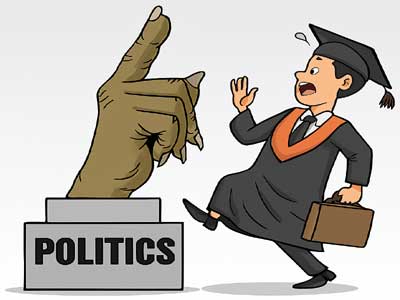Is our democracy tired? Has the spark of change been extinguished? The energy and passion with which student movements guided democracy in past decades and during the freedom struggle are completely absent today.
Whether it's India or America, France or South Africa, that youth tide that could shake the corridors of power no longer rises from anywhere. Our campuses, once hubs of revolution, are now silent. The silence of JNU is startling.
Campuses like BHU, Allahabad, and Lucknow, once laboratories of ideas, have faded. Student union elections have either been completely abolished or reduced to a mere formality. This not only distances young people from politics but also deprives them of essential leadership experience.
Our youth today don't dream of revolution. Their sole focus remains on going abroad. Educational corridors are shamelessly promoting fashion parades or new-age lifestyles with drugs, alcohol, and free sex. The educated, young, global, and digital generation is politically 'switched off.' They are so busy with careers, startups, plans to go abroad, reel-making, YouTubing, and Instagram branding that they don't even feel that the fight for change is their responsibility.
Perhaps it's not entirely their fault. The way politics has been linked with corruption, opportunism, and dynasticism has broken the trust of young people. They consider it a 'gutter' and prioritise 'self-growth.'
Political parties have reduced young people to mere machines for sticking posters or running trends. Traditional parties are dominated by old faces. Any young leaders who do appear are either products of nepotism or social media projects. The reality is that whether it's Rahul Gandhi, Akhilesh Yadav, or Tejashwi Yadav, their age might be less, but they are part of the same system that suppresses youthful thought.
Indeed, this is a universal trend, not just an Indian problem. This emptiness is not limited to India. In America, progressive politics once received youthful energy, but party structures sidelined it. In Britain, the Labour Party has long been disconnected from the youth. In France and Latin America, there are scattered protests, but no organised movements.
While taking to the streets was necessary for revolution in the 70s, today's movements are confined to '#'. Digital activism is easy, but it lacks the pulse that can challenge governance. Reels and retweets don't bring about revolution.
What now? Universities should restore student union elections, without government interference or fear. Political parties must open their doors to youth—not just for show. Democratic education must be revitalised at the school and college levels. Ideologies must be made relevant again—politics isn't just about election-winning strategies.
Today, as we witness the rise of authoritarian tendencies, censorship, and populism all over the world, this silence is dangerous. When youth stop asking questions, power becomes unchecked.
Therefore, now is the time for debates to resume on campuses, posters to be put up, and slogans to echo. Otherwise, this slow heartbeat of democracy might one day cease.
















Related Items
Modern Odyssey of Indian Agriculture...
2025: A Defining Year for Indian Growth…
RSS Chief is ‘Right’, Indian unity is not a 'British Gift’